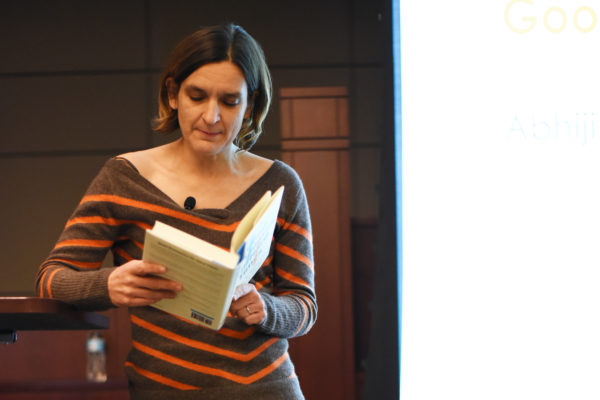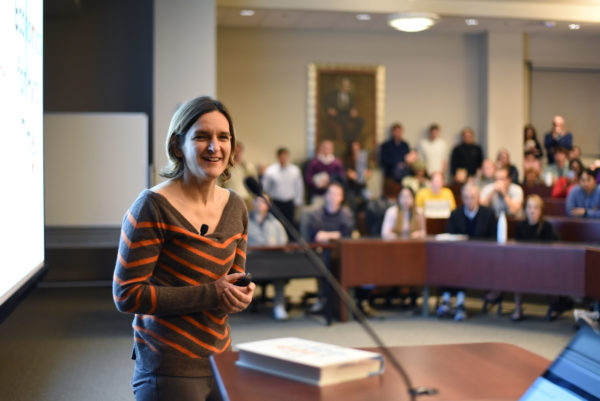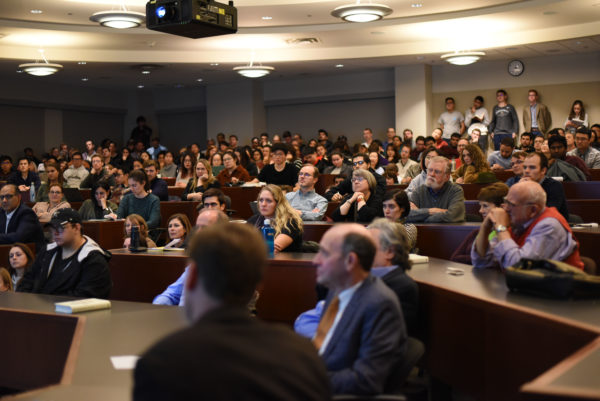Nobel Winner Esther Duflo Challenges Economic Myths at Steine Lecture
A standing-room-only crowd packed the Flynn Auditorium on November 14 to hear Nobel Laureate Esther Duflo deliver the David Steine Lecture in Economics, sponsored by the College of Arts and Science Department of Economics. Duflo, who is the Abdul Latif Jameel Professor of Poverty Alleviation and Development Economics at the Massachusetts Institute of Technology, shared the 2019 Nobel Prize in Economics with Abhijit Banerjee and Michael Kremer. Banerjee and Duflo are co-authors of the Financial Times and Goldman Sachs Business Book of the Year Poor Economics: A Radical Rethinking of the Way to Fight Global Poverty and of the newly-published Good Economics for Hard Times. Duflo is the youngest-ever and only the second female recipient of the Economics Nobel. She has also won numerous other academic honors and prizes, including the American Economics Association’s John Bates Clark Medal and a MacArthur “Genius Grant.”

Citing several studies from both the U.S. and Europe, Duflo dove into what she sees as the central problem in the field of economics: the public doesn’t trust economists. This lack of trust is deeply problematic, she pointed out, because many of today’s key issues—poverty, immigration, climate change, Brexit—are either economic at their core or closely tied to economics. Duflo suggested possible reasons for the distrust: differing worldviews, a misperception that economists are primarily forecasters (and bad ones at that), and economists’ failure to make their research accessible to the general public.
As a result, Duflo said, the electorate tends to evaluate economic issues based on rhetoric, not research. This limited understanding causes people to elect leaders who are persuasive over those who will implement sound policy, and economics-based issues remain unsolved. Reading from the opening to Good Economics, however, Duflo said, “We wrote this book to hold onto hope.” Economists can still have a positive and meaningful impact on today’s most pressing problems, and Duflo shared her recommendations for action.
First, she said, economists must reexamine common assumptions about the relationship between economics and human behavior. These include the assumption that people respond reliably to financial incentives, that they move readily for new or more lucrative work, that they make rational economic choices and don’t change their personal preferences easily, and that they care more about money than about their own dignity.

Research conducted for Good Economics showed that such assumptions differ wildly from reality. Tax and welfare records, census and immigration data, psychological studies, health records, and more all refute what Duflo called “Economics 101” ideas. Tax rates and work-for-welfare requirements don’t affect the number of hours people work. Overall, the U.S. is neither geographically nor economically mobile—in fact, mobility is only half what it was 70 years ago. Personal taste is both highly malleable and a strong influence on economic choices. And dignity is so crucial that people are doing without government aid and committing suicide in record numbers due to shame and hopelessness over financial hardship.
These data-based lessons have several implications for economic policy. First, said Duflo, “We need to pay more attention to the pains from trade.” Trade policies should go hand-in-hand with policies for assisting those affected by tariffs or other trade weapons. Paying for such assistance is tricky: although data shows that people are not responsive to taxation, voters assume that higher taxes will have a negative impact on their lives. Duflo recommended that governments solve this conundrum by starting with politically popular tax increases on the wealthiest citizens and clearly tying the new funds to new programs or expansions of existing programs.
Second, the malleability of people’s preferences means that we have a fighting chance against climate change. Education can increase public support for eco-friendly policies and influence people to change their personal habits, paving the way for meaningful climate action on both the public and private fronts.

Finally, the alarming rise in “deaths of despair” points to what Duflo called “a Victorian hangover” in our social welfare system. “We need to put dignity back at the center of social protection,” she said. By co-opting a narrative commonly used by populists—that victims of economic displacement are like war victims—governments can justify programs to help the unemployed or at-risk workers. Framing the situation this way also makes assistance more palatable to recipients, who begin to see themselves as heroes rather than people who are too weak to “pull themselves up by their bootstraps and live the American Dream.”
Economists can participate in and support these kinds of policy changes, Duflo said, by following a simple, research-backed rule: when trying to influence a debate, lead with reason. “As economists, we not only start with the conclusion, we often stop there,” she said. Studies of physicians’ discussions with anti-vaccinators, however, show that leading with the conclusion is the least effective way to change someone’s mind. Instead, starting with the reasons for a belief makes greater impact. That means, said Duflo, that economists have to start explaining themselves—and in a way the general public can understand. If they do, they can begin to reverse the onerous distrust she highlighted at the beginning of her lecture.
“People want to hold onto hope that things will get better,” she said, and economists can harness that hope to lead the way to better policies and better choices.
